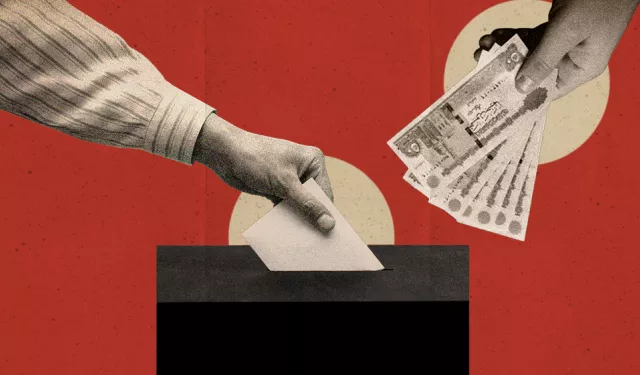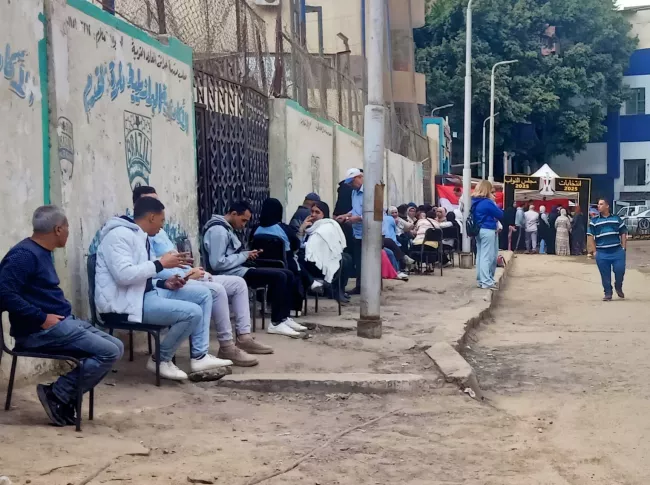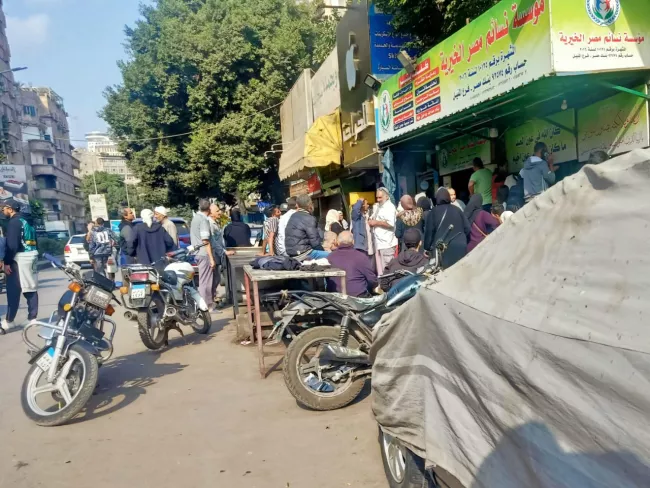
Election rigged by bribery, no matter the president’s shout
In contrast to the Egyptian saying “nothing stays the same,” the second phase of the parliamentary elections confirmed the opposite. There seems to be no path to a less brazen electoral scene, even when the president himself speaks up.
The second phase opened with the same playbook as the first, repeating the same violations: vote buying, steering voters, campaigning around polling stations, and manufactured crowds.
Electoral bribes emerged as the only familiar, well-worn road to a seat in parliament, in complete disregard for the fallout from the first phase. That earlier round had pushed President Abdel Fattah El-Sisi to call for a thorough review of “incidents that took place in some constituencies,” leading to the annulment of elections in 19 districts across seven governorates.
Expectations rose that things would be different after the head of state urged officials to uphold the “true will of voters” and warned against repeating violations in the remaining phases. Al Manassa toured several districts on Monday to see whether anything had changed. Nothing had.
“The TV is coming to film”
Attempts to manufacture the appearance of high turnout through staged lines began as soon as the polls opened. In the first hour of voting, Al Manassa documented the scene outside Hadaeq El-Maadi National School and the Gomhouria Official Language School, where roughly 80 people sat on chairs lined up along the schools’ outer walls.
As soon as a camera crew from Al Arabiya TV channel appeared in front of Hadaeq El-Maadi School, a security officer in plainclothes called out to another: “The TV is coming to film, get people to stand up.”
A long queue of old and young people quickly formed, only to dissolve moments later when the cameras stopped rolling. Once filming ended, the “electoral extras” returned to their seats.
The scene was no different at Gomhouria School. Inside, the polling stations were nearly empty, while a group of older people sat on the sidewalk outside.
Although campaign banners were absent outside both schools, mobilization continued. Al Manassa observed taxis and microbuses transporting older voters from gathering points on El-Teraa Street—near the popular market in Maadi—to the two schools, then taking them back again.
One microbus driver, who asked not to be named, said the operation was overseen by individuals affiliated with the Maadi office of the Nation’s Future Party. He said each voter received a cash payment, without saying how much, in exchange for voting for the National List and for the party’s individual-seat candidate, Wael Saada, number 1 on the ballot paper.
A call to stop “the farce”
Roughly 140 kilometers from Maadi, the scene was the same. In a Facebook Live video, Tagammu Party candidate Ahmed Belal, running in Mahalla El-Kubra, filmed a shop and pointed to it, saying, “This is where they’re buying votes.”
“It is as if the president’s directions have had no impact on some people. Unfortunately, vote buying is still ongoing,” Belal said, calling for state intervention. “We are calling on the Egyptian state to intervene to stop this farce that some people are determined to continue.”
About two and a half hours later, the Interior Ministry posted a statement on Facebook that included a screen shot of Belal's video in addition to photos of four people seated in front of stacks of banknotes and national ID cards.
The ministry said it had detected two violations in Mahalla and arrested those involved “in a garage and on a nearby street, for collecting a number of citizens’ national ID cards and possessing sums of money in preparation for distributing them in exchange for voting for two candidates.” It said the suspects were referred to the Public Prosecution and that the National Elections Authority/NEA, was notified.
This was not the Interior Ministry’s only statement about violations. In another, it said it had taken legal action against a candidate in Helwan who verbally abused two people while they were casting their ballots after they refused to vote for him.
The ministry also said it had “clarified the circumstances of a video clip circulated on social media showing a parliamentary candidate claiming that security forces had detained two people outside an electoral district in Cairo’s Zawiya Al-Hamra for buying votes for another candidate.” It said legal measures were taken and that the Public Prosecution had opened an investigation.
In a further statement, the ministry said it had clarified “the circumstances of a video clip circulated on social media showing a person throwing a bottle containing a flammable substance into the waiting area of a polling station” in Nabrouh in Dakahliya. It said the person was arrested and “was suffering from a psychological condition, which was known among residents of his neighborhood.”
300 pounds for a vote in Manial
Belal’s appeal did not stop the farce.
In Manial, independent candidate Ahmed Ragab Mawhoub, who is running for the individual seat in the Masr El-Qadima district, said his rival—independent candidate Taher El-Khouli—was using the Nesa’im Masr Charity Association to buy votes and distribute money to voters after they cast their ballots, paying 300 Egyptian pounds (about $6) per vote.
Mawhoub told Al Manassa that he had reported the violations and breaches of the ban on campaigning around polling stations to the Public Funds Investigations Department and the NEA. “The investigators confirmed they would visit the association’s office on Manial Street, across from the Tax Authority building,” he said.
From Old Cairo to New Cairo
Al Manassa continued its tour in Nasr City and Heliopolis, where it witnessed the same scenes: groups of young men and women, used as extras, sitting outside polling stations under the supervision of a man in plainclothes who ordered them into two lines whenever media crews appeared.
Outside Al-Manara Secondary School for Girls in Nasr City, several young men and women, some of them teenagers, sat on the sidewalk. Two microbuses arrived carrying groups of women who walked directly into the polling stations.
Outside Abbas El-Akkad School in the same district, Al Manassa observed around 50 young men and women standing in two lines at the entrance. Over the hour that our reporter spent there, only about three actual voters arrived; they walked straight into the polling stations without waiting in line.
Those in the manufactured queue covered their faces whenever someone tried to film them. Al Manassa did not observe any cash bribes being paid outside the two schools, and no campaign banners were visible.
Similar scenes unfolded outside Al-Tabary Secondary School for Boys and Rashid Primary School in Heliopolis: staged lines, with real turnout sparse. The line outside Al-Tabary did not move, and most of those in it appeared to know one another.
The pattern repeated in Basateen and Dar El-Salam. Al-Farouk Primary School 2 and the El-Me‘mariya Secondary School for Boys saw relatively higher turnout early in the day, while turnout remained limited at Al-Farouk Primary School 1, Ahmed Zewail School, and Mohamed Naguib School. Campaign posters and party banners were absent.
More than 20 young men dressed entirely in black, with no logos or identifying marks, were seen organizing lines outside Ahmed Zewail School and Al-Farouk 2.
Al Manassa observed dozens of voters being transported to polling stations in small buses and microbuses, many displaying campaign posters for Homeland Defenders Party candidate Ali Abdalwanis and independent candidate Sayed Abdel Rahman.
Many of those waiting in line carried cards printed with their polling station and roll number, and on the reverse side, the photos of three candidates: Nation’s Future Party’s Mahmoud El-Sheikh, Homeland Defenders’ Ali Abdalwanis, and Conservative Party candidate Islam Akmal Kortam.
In a Facebook Live video, candidate Khaled Abdel Aziz documented what he said were “violations” and “voter steering” through “coupons” directing voters to choose candidates from the three parties running under the National List banner. He said he would file a complaint with the presidency.
Meals and 200 pounds in Boulaq Abul Ela
In Boulaq Abul Ela, Reform and Renaissance Party candidate Monica Magdy posted a Facebook Live video pointing to a group of people distributing “meals and 200 pounds” to voters on behalf of “a particular candidate.” She said the group “is intimidating people and taking their ID cards.”
Members of the group then turned on her, shouting, “Why are you filming us? May God hold you to account.” A campaign poster for Nation’s Future candidate Mohamed Abdel Rahman Radi was visible behind them.
In another video, she said “all the schools have fake crowds while the polling stations inside are empty.”
“The scene is absurd. This isn’t an election, and these aren’t the elections the president was speaking of,” Magdy said.
Vote buying was not limited to Gharbiya and Cairo. A video on a local website showed votes being bought in El-Bagour in Menoufiya Governorate on behalf of Homeland Defenders candidate Mohamed Fayez.
Operations rooms for the Conservative Party and the Awareness Party also reported violations in several constituencies. These included polling stations in Cairo and Sharqiya that opened more than half an hour late, as well as voter mobilization, steering, and vote buying outside polling places.
The NEA said it had taken measures against violations in some polling stations but warned against posting incidents on social media. It stressed that any violations should be reported directly to the NEA and other official bodies. It also warned against what it called campaigns aimed at casting doubt on or “defaming” the elections.
Yet the official reporting channels were effectively blocked. As Magdy said in a third video, “Sorry, there are going to be a lot of live videos today, because whenever I try to file an incident report, they tell me it can’t be done, so I’m documenting it on social media instead.”
Pointing to a group standing outside one of the polling stations in her district, she said they did not have the right to vote there. “What are these people doing here? As soon as I started documenting what was happening, everyone panicked and began to leave.”
The second phase, then, was even more brazen than the first, particularly given that it came after the president’s November 17 call on the NEA not to “hesitate to take the right decision when it is impossible to ascertain the true will of the voters, whether by canceling this election phase in full or partially canceling it in one or more constituencies.” He ended his statement with “Long live Egypt! Long live Egypt! Long live Egypt!”
Some believed the president’s seismic intervention would breathe new life into the elections and lend legitimacy to what is expected to be Sisi’s final parliament. But it appears that those tasked with engineering the elections know no other way to create even the appearance of a democratic process, at least for the cameras. And so the second phase unfolded just like the first, as if nothing had happened at all.



